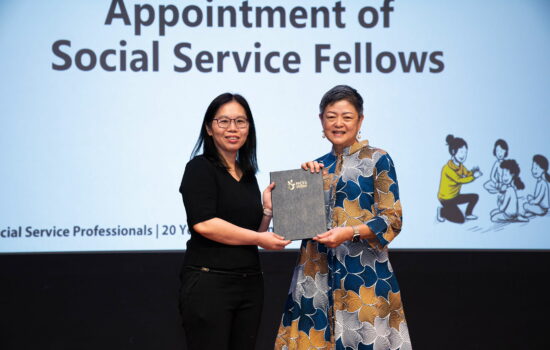For 7-year-old Syaza Hidayah, much of her childhood days were spent in the hospital and clinics, instead of playing with her peers at the playground. The “friends” whom she has become familiar with are doctors, nurses and physiotherapists.
Living with global developmental delay, coupled with movement disorder, as well as hearing loss and visual loss, Syaza needs assistance in daily activities such as toileting, bathing and feeding.
“As her mother, I do feel sad because Syaza is not like any other children. But with the strong support from our family, friends and teachers, I hope Syaza will get the best treatment and be treated like any other normal kid,” said Syaza’s mother.

For several years, Syaza attended the Early Intervention Programme for Infants & Children (EIPIC) at SPD@Jurong. Her physiotherapist Sivanandam Chandrasekaran, worked to improve her neck control and hip alignment, as well as prevent ankle deformity.
Prior to the COVID-19 situation, Syaza also attended the aquatherapy programme offered by the centre, where she always had fun kicking in the water with the help of a floating device and support from our early intervention professionals.
“Aquatherapy had helped Syaza to reduce muscle tightness and facilitate her movements easily in the water,” said Chandrasekaran.
Playing in the water is an enjoyable way to engage children with disabilities. The soothing properties of the liquid environment help these children to exercise more freely in the water. This is especially helpful for children with disabilities who may find it challenging to exercise on land.

To enable Syaza to communicate with her loved ones, the EIPIC team also taught her to use a communication device that produces voice-recorded messages. Syaza’s mother, who is her primary caregiver, said that Syaza looks forward to seeing and communicating with the family members, through touch and by hearing their voices. When they talk to her, she is happy and would respond with smiles.
Besides working with Syaza, the early intervention team also trained her mother and helper on positioning Syaza, facilitating her movements and performing stretching exercises at home. With better neck control, Syaza can participate in activities by lifting her head to look around or listen to songs and family conversations.
“Syaza enjoys looking at different sensory materials and toys like brightly coloured lights and balloons. After attending EIPIC, she has gained better neck control in supported sitting positions and is now able to engage in leisure activities by lifting her head to listen or look at the stimulus such as songs and lighted toys,” shared Chandrasekaran.

Thanks to the support and care from SPD’s early intervention team, Syaza has graduated from EIPIC and is now attending a special education school.
When asked about her thoughts on Syaza’s future, her mother shared that she hopes to continue caring for Syaza, providing her with the needed intervention so she can continue her education.
This article is adapted from “6-year-old girl with disabilities inspires her family to grow stronger with her” which was first published by 99.co.





